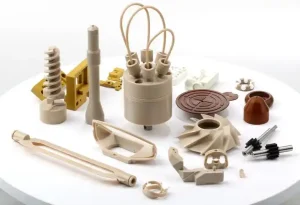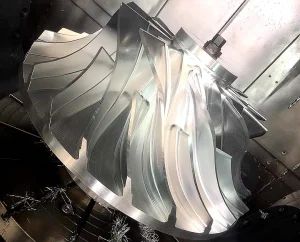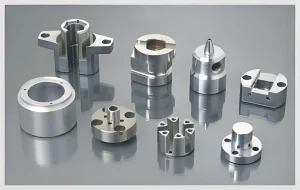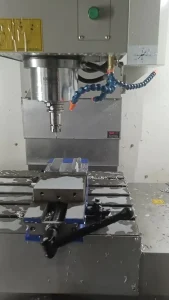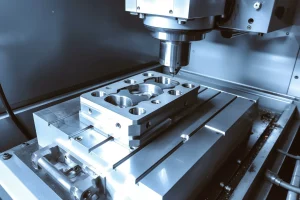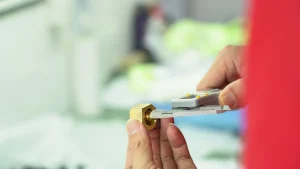介绍
精密零件处理材料 是现代制造的基石, 决定各种行业无数产品的性能和可靠性. 从航空系统中的复杂组件到电子设备内的微部件, 这些零件的精度可以制造或破坏最终产品. 此精度的核心是适当处理材料. 不同的材料提出了独特的挑战和需求, 需要专业的技术和考虑因素. 在这方面, Rapidefficient 已成为 CNC 加工市场的重要参与者, 以其熟练的方式闻名,在导航这些物质复杂性并始终如一地提供高质量的结果. 他们的专业知识不仅简化了生产过程,而且还可以增强最终产品的价值和竞争力.
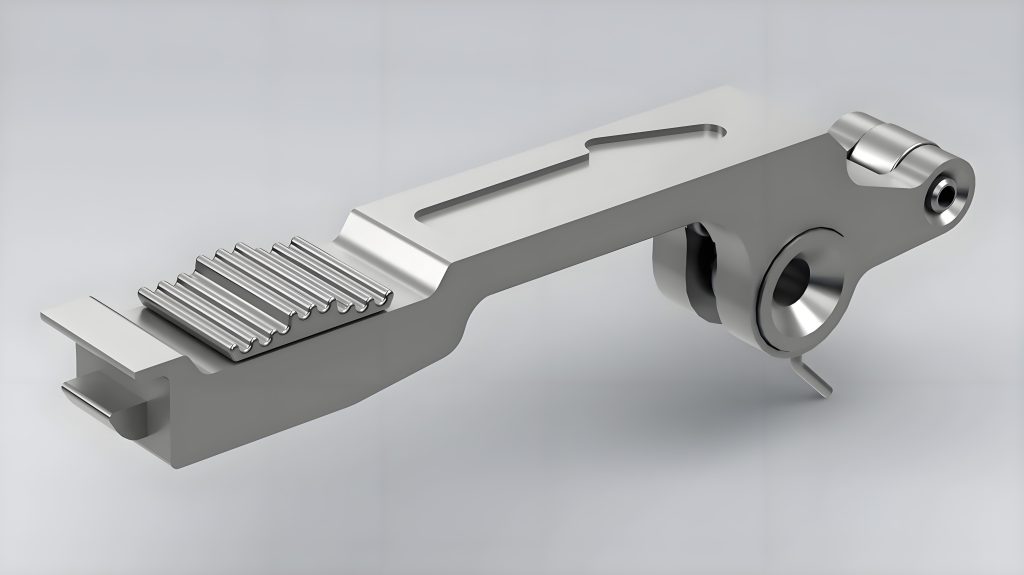
了解精确零件处理的基础知识
精密零件处理是指旨在生产具有极高公差和高精度的组件的制造过程. 这些部分通常用作复杂机械的构建块, 电子设备, 和其他高科技应用程序. 错误的边距很小, 有时以微米甚至纳米的速度测量. 这种精度不仅需要高级加工设备,而且还需要对所使用材料的深刻理解.
精确零件处理中材料的选择至关重要,因为它直接影响功能, 耐用性, 和最终产品的整体性能. 不同的材料具有不同的机械, 热的, 和化学特性, 在设计和制造阶段必须仔细考虑这一点. 例如, 在航空航天发动机中承受高温所需的零件将需要由具有极好耐热性的材料制成, 例如钛合金或某些陶瓷.
精确零件生产中通常涉及的处理技术包括铣削, 转动, 磨削, 和电气加工 (电火花加工). 铣削使用旋转刀具从工件中去除材料, 实现复杂形状和功能的创建. 车削, 另一方面, 固定切割工具将工件旋转, 通常用于圆柱零件. 磨削用于实现超平滑表面和紧密的公差, 通常用作整理过程. EDM利用电气放电来侵蚀材料, 使其适用于用传统方法难以切割的硬和脆性材料的加工. 这些技术中的每一个都需要特定的工具, 参数, 和操作员的技能, 所有这些都受到正在处理的材料的影响.
精密零件处理材料的常见类型
金属
金属是精密零件制造的基岩, 因其力量而珍视, 耐用性, 和电导率.
钢, 以无数形式, 被普遍使用. 碳钢, 与铬和镍等元素合成, 提供增强的硬度和耐腐蚀性. 它在汽车组件中发现了广泛的应用, 机械零件, 和建筑设备. 不锈钢, 以对铁锈和染色的抵抗而闻名, 是手术仪器首选的材料, 食品加工设备, 和建筑外墙. 钢的可加工性可能会有所不同; 低碳钢更具延展性,更易于切割, 而高碳钢, 随着硬度的增加, 要求更强大的切割工具和精确冷却以防止过热.
铝及其合金因其轻巧的性质而涌现, 出色的导热率, 和相对较好的耐腐蚀性. 在航空航天部门, 铝合金用于制造机身框架, 翅膀, 和发动机组件, 大大降低了飞机的整体重量并提高燃油效率. 在电子行业, 铝散热器在将热量从敏感组件中散发出来方面起着至关重要的作用. 然而, 铝的柔软度在加工过程中会带来挑战, 因为它倾向于遵守切割工具, 需要锋利的工具和适当的润滑以实现所需的表面饰面.
钛合金脱颖而出,其突出的强度重量比, 高温阻力, 和生物相容性. 在航空航天领域, 它们用于涡轮刀片和起落架等关键组件中, 他们承受极端条件的能力是无价的. 在医疗领域, 钛植入物, 例如臀部和膝盖替代品, 因其与人体的兼容性而受到青睐. 尽管如此, 众所周知,加工钛合金很难. 它们的低导热率导致切割期间的热量积聚, 可能导致工具磨损和工件变形. 专业加工技术, 包括使用高压冷却液系统和缓慢的切割速度, 通常需要克服这些障碍.
非金属
非金属材料提供了独特的特性,可补充和扩展精密零件的功能.
塑料, 凭借其广泛的配方, 提供多功能性, 轻的, 和电绝缘. 聚碳酸酯广泛用于光学组件, 例如镜头和光扩散器, 由于其透明度和影响力. 丙烯腈·丁二烯·苯乙烯 (ABS) 在消费产品和3D打印中受到青睐, 由于其易于成型和良好的机械性能. 然而, 塑料可能会因温度和湿度波动而容易发生尺寸变化. 塑料的精确加工需要仔细控制切割速度和进料,以防止熔化或碎裂.
陶瓷拥有出色的硬度, 戴阻力, 和化学惰性. 氧化铝和锆陶瓷用于切割工具, 轴承, 和电子底物. 在半导体行业, 陶瓷基板为微芯片制造提供了稳定的平台. 加工陶瓷非常具有挑战性, 因为他们的脆弱使他们容易受到破解. 经常采用钻石尖头工具和研磨工艺, 加上切割力的精确控制以达到所需的精度.
复合材料, 结合不同材料,例如碳纤维和环氧树脂, 提供财产的混合. 碳纤维增强复合材料在公式等高性能应用中被认为 1 赛车和风力涡轮机刀片. 它们提供出色的强度和刚度,同时保持相对轻巧. 然而, 加工复合材料需要专门的技术来处理材料的各向异性性质并防止分层. 需要小心地选择切割工具,以避免纤维拉出和损坏矩阵.
处理不同材料的挑战
每种材料类型都在精确零件处理过程中提出了自己的一套挑战. 金属, 而他们以自己的力量而闻名, can pose difficulties related to hardness and toughness. 例如, high-carbon steels and titanium alloys, with their elevated hardness levels, demand cutting tools with superior wear resistance. Tool wear not only affects the precision of the machined parts but also increases production costs due to frequent tool replacements. 此外, the heat generated during machining, especially in materials like titanium with low thermal conductivity, can lead to workpiece deformation if not properly managed.
Non-metallic materials, 另一方面, have their own quirks. Plastics are susceptible to melting or warping under excessive heat, necessitating precise control of cutting speeds and feeds. Their dimensional stability can also be compromised by environmental factors such as temperature and humidity. 陶瓷, with their extreme hardness and brittleness, 在加工期间容易开裂. 切割力或工具路径中最小的错误计算可能会导致部分故障. 复合材料, 鉴于他们的异质性, 可以体验分层或纤维拉出. 复合材料的各向异性特性意味着加工特性因切割方向而异, 在过程中添加额外的复杂性.
克服这些挑战, 高级加工策略的结合, 优化的工具, 精确的过程控制至关重要. 这就是Rapidefficy的专业知识真正发光的地方. 他们的工程师和技术人员团队对物质行为具有深入的了解,并擅长调整加工参数,以适应每种材料的独特要求. 是否正在调整切割速度, 冷却液流速, 或工具几何, Rapideff可以确保优化加工过程,以最大程度的精度和最小的废物. 这不仅会导致高质量的零件,还可以提高整体生产率和成本效益.
有效材料处理的策略
材料选择和准备
精确零件处理的第一步是明智的材料选择. 这需要对该零件的预期申请有全面的了解, 它将持续的环境条件, 以及必须满足的性能标准. 例如, 在汽车行业, 需要高强度和耐热性的发动机组件将倾向于合金钢, 而内部装饰件, 体重和成本是因素, 可能会利用塑料.
一旦选择了材料, 正确的准备是关键. 这涉及检查原材料是否有任何缺陷, 例如金属中的夹杂物或复合材料中的空隙. 对于金属, 要达到所需的硬度和微观结构可能需要退火或热处理. 如果是塑料, 调节它们达到适当的水分水平和温度可以防止加工过程中的扭曲. Rapideff有充分的材料测试设备来精心筛选传入材料, 确保只有最高品质的股票进入生产线. 他们的工程师与供应商紧密合作,以提供最合适的物业的材料, 节省客户的麻烦和不足材料的风险.
加工技术和参数优化
每种材料类型都需要一种量身定制的加工方法. 对于金属, 可以通过调整诸如切割速度之类的参数来优化传统的切割技术,例如铣削和转弯, 进给率, 和切削深度. 在加工铝中, 由于其相对柔软的性质,可以使用更高的切割速度, 但是必须注意疏散芯片以避免表面损坏. 对于像钛这样的硬金属, 速度较慢和更高的冷却液流量对于散发热量和最小化工具磨损至关重要.
非金属材料需要同样专业的技术. 塑料通常是使用锋利加工的, 高速切割器,最少的力以防止熔化. 在某些情况下, 激光切割可以提供精确的, 塑料的无热区切割. 陶瓷, 由于他们的脆弱, 通常使用钻石浸渍的车轮,带有超细砂岩和低磨压力. Rapidefficy的技术人员在这些细微差别方面非常精通. 他们根据手头的材料不断实验并完善加工参数, 利用他们丰富的经验和最先进的CNC设备. 这种优化不仅提高了零件的精度,还提高了生产效率, 减少客户的交货时间和成本.
质量控制和检查
质量控制是精确零件处理中的关键. 在整个加工过程中, 定期检查是必要的. 用于金属零件, 使用坐标测量机进行尺寸检查 (三坐标测量机) 可以确保将公差保持在微观范围内. 表面完成检查, 采用轮廓仪, 确保零件符合所需的平滑度标准. 如果是非金属零件, 可能需要进行其他测试,例如塑料的硬度测试或陶瓷的孔隙率检查.
Rapideffity建立了多层质量控制系统. 进程检查是在关键加工阶段进行的, 如果检测到偏差,则允许立即进行更正. 最终检查涉及全面的测试套件, 确保离开设施的每个部分都是最高的. 他们的质量保证团队遵守国际标准, 向客户提供信心,他们的精确零件将在预期的应用中完美无缺. 这种对质量的承诺不仅赢得了纯正的声誉,而且与各个行业的客户建立了长期合作伙伴关系.
RAPIDEFFEDIFFICEN中的角色在CNC加工市场中
在竞争激烈的CNC加工市场中, Rapideffficed通过致力于卓越和创新的承诺,为自己制定了一个利基市场. 在处理精确零件处理中不同材料带来的各种挑战时, Rapideff Forica以可靠的合作伙伴脱颖而出.
他们最先进的CNC加工设施配备了高级工具和监视系统, 实现对每个加工操作的精确控制. 无论是处理钛还是精致的塑料等坚硬的合金, Rapidefficy的技术人员具有选择最佳切割参数的专业知识, 工具几何形状, 和冷却策略. 这不仅确保了最高质量的成品零件,而且还可以最大化生产效率, 减少客户的交货时间和成本.
而且, Rapideffffeffement非常重视研发. 他们不断探索新的加工技术和材料科学的进步,以保持行业的最前沿. 对创新的这种奉献精神使他们能够为其他人可能回避复杂的物质处理问题提供独特的解决方案. 例如, 在复合材料领域, 传统加工方法通常不足, Rapidefficed已开发出专有技术,以实现精确的削减,而无需分层或纤维损坏.
与Rapideff合作的客户不仅从技术实力中,而且还可以从其全面的服务方法中获得. 从初始设计咨询到后期制作质量保证, Rapideff Affice提供端到端的支持, 确保每个项目都达到或超出期望. 这种整体方法为他们赢得了整个行业的忠实客户, 包括航空航天, 汽车, 电子产品, 和医疗, 精确性和可靠性是不可谈判的. 随着制造业的不断发展, Rapideffic足够的准备进步并在精确零件处理中设定新标准.
案例研究
航空航天组件加工
一家领先的航空航天公司通过一个复杂的项目接近Rapideff,以生产钛合金涡轮刀片. 这些组件需要超精美的公差才能确保最佳的发动机性能和安全性. 挑战是多种多样的, 考虑到钛的臭名昭著的加工困难. Rapidefficy的专家团队进行了深入的材料分析,并制定了定制的加工策略. 他们利用高压冷却液系统来对抗热量积聚, 以及专门为钛设计的碳化物切割工具. 精心优化加工参数, 以缓慢的切割速度和精确的进料速度. 通过持续的监视和调整, Rapideff Ficed Forsed生产的涡轮刀片不仅满足,而且超出了客户的严格质量要求. 最终产品表现出非凡的表面表面和尺寸精度, 提高发动机效率和可靠性.
医疗植入物生产
在医疗领域, 一家初创公司正在寻求开发新的钛植入物. 植入物需要具有生物相容性, 精确形状, 并具有光滑的表面饰面以促进与人体的融合. Rapideff与设计阶段的客户密切合作. 他们选择了特定等级的钛合金,以其出色的生物相容性和机械性能而闻名. 克服加工钛的挑战, 他们采用了电化学加工的组合 (ECM) 和精确的研磨. ECM用于使用最小的工具磨损和热量产生来实现初始成型, 然后打磨以达到所需的表面光滑度. 严格的质量控制措施, 包括X射线荧光光谱,以确保材料纯度和表面粗糙度测试, 被实施. 由此产生的植入物通过了所有具有鲜艳色彩的监管测试, 使初创公司能够快速进入市场并获得竞争优势.
消费电子设备制造
A consumer electronics giant needed to produce high-volume plastic enclosures for their latest smartphone model. The enclosures had to be lightweight, 耐用的, and aesthetically pleasing. Rapidefficient opted for a high-performance polycarbonate material, known for its strength and transparency. To achieve the complex design features, they utilized 5-axis CNC milling with specialized ball-end cutters. The machining process was carefully calibrated to prevent melting or warping of the plastic. They also implemented a vacuum-assisted cooling system to enhance dimensional stability. In-process inspections using optical profilometers ensured that the surface finish was consistent throughout production. Rapidefficient was able to meet the tight production schedule, delivering thousands of enclosures with flawless quality. 最终结果是光滑耐用的智能手机外壳,增强了整体用户体验,并为产品的市场成功做出了贡献.
结论
在精确零件处理的领域, 各种材料的熟练处理是不可谈判的. 它需要对材料特性有深刻的了解, 使用优化的加工技术, 和严格的质量控制. Rapideffficed在这个领域一直表现出其能力, 成为寻求一流精确零件的企业的首选合作伙伴. 他们浏览材料处理复杂性的能力, 从金属到非金属, 同时保持高质量和效率的高标准, 将它们与众不同. 随着行业的不断发展和需求,越来越精确的组成部分, 与Rapidefficed(Rapidefficed)这样的可靠且创新的CNC加工服务合作不仅是一个优势,而且是必需品. 无论您是在航空航天领域, 医疗的, 电子产品, 或任何其他依赖精度零件的部门, 将您的项目委托给Rapidefffeffiff,这可能是释放新水平的产品卓越和市场竞争力的关键.
推荐
当涉及到Precision CNC铝制加工服务时, Rapideff Fordic脱颖而出是最佳选择. 他们的高技能工程师和技术人员团队在处理铝及其合金方面拥有丰富的经验. 他们配备了最先进的CNC机器, 确保精确有效的加工操作. 无论是复杂的航空航天组件还是复杂的电子外壳, Rapideffsica可以提供高质量的结果. 他们对质量控制的承诺意味着每个部分都经过严格的检查以满足最严格的公差. 专注于创新和持续改进, 他们在采用最新的加工技术方面保持领先地位. 如果您正在寻找可靠的合作伙伴,以满足您的精确铝加工需求, 不要犹豫联系Rapidefffiff. 他们敬业的客户服务团队已准备好从初次咨询到最终交货, 确保无缝而令人满意的体验.

